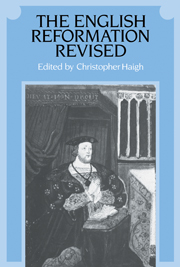Book contents
- Frontmatter
- Contents
- List of illustrations
- Acknowledgements
- Preface
- List of abbreviations
- Introduction
- 1 The recent historiography of the English Reformation
- 2 Church courts and the Reformation in the diocese of Chichester, 1500–58
- 3 Anticlericalism and the English Reformation
- 4 The Henrician Reformation and the parish clergy
- 5 Popular reactions to the Reformation during the years of uncertainty, 1530–70
- 6 The local impact of the Tudor Reformations
- 7 Revival and reform in Mary Tudor's Church: a question of money
- 8 Bonner and the Marian persecutions
- 9 The continuity of Catholicism in the English Reformation
- Conclusion
- Index
5 - Popular reactions to the Reformation during the years of uncertainty, 1530–70
Published online by Cambridge University Press: 20 January 2010
- Frontmatter
- Contents
- List of illustrations
- Acknowledgements
- Preface
- List of abbreviations
- Introduction
- 1 The recent historiography of the English Reformation
- 2 Church courts and the Reformation in the diocese of Chichester, 1500–58
- 3 Anticlericalism and the English Reformation
- 4 The Henrician Reformation and the parish clergy
- 5 Popular reactions to the Reformation during the years of uncertainty, 1530–70
- 6 The local impact of the Tudor Reformations
- 7 Revival and reform in Mary Tudor's Church: a question of money
- 8 Bonner and the Marian persecutions
- 9 The continuity of Catholicism in the English Reformation
- Conclusion
- Index
Summary
The Reformation provides perhaps the earliest instance in English history of conflicts over beliefs and attitudes in which ordinary people not only took sides in large numbers but also left those choices on record for posterity. Recent researches, especially at regional level, are beginning to show just how complex and fascinating those battles were. Gone is the commonplace assumption of nineteenth- and early twentieth-century historians that the battle was a simple one between ‘Catholics’ and ‘Protestants’, in which the ‘True Church’ was overthrown or revitalised according to one's prejudices; and gone too the assumption that almost everyone was passionately involved in the doctrinal issues at stake. There must have been many, lay and clerical, with the attitude of Vicar Aleyn of Bray, who kept his living from Henry VIII's reign to that of Elizabeth I. ‘Being taxed by one for being a turncoat and an unconstant changeling, “Not so”, said he, “for I always kept my principle, which is this, to live and die the vicar of Bray”.’ Nevertheless, a Christian cosmological framework was accepted (outwardly at least) by almost everyone, despite the massive evidence for semi- or anti-Christian beliefs assembled by Keith Thomas and others. Given that framework, it is not surprising that the various ecclesiastical and doctrinal changes imposed by the Crown provoked strong feelings both of support and of opposition. Historians will always disagree how far the divisions reflected real doctrinal disagreement and how far they were provoked by the social, economic and political changes that were bound up with the successive church settlements; but the fact of a deeply divided country is incontrovertible.
- Type
- Chapter
- Information
- The English Reformation Revised , pp. 94 - 113Publisher: Cambridge University PressPrint publication year: 1987
- 1
- Cited by



